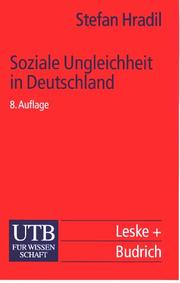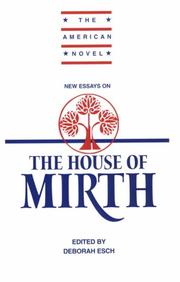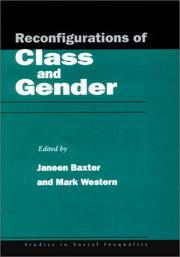| Listing 1 - 5 of 5 |
Sort by
|

ISBN: 3825218090 Year: 2001 Publisher: Opladen : Leske+Budrich,
Abstract | Keywords | Export | Availability | Bookmark
 Loading...
Loading...Choose an application
- Reference Manager
- EndNote
- RefWorks (Direct export to RefWorks)
Duitsland --- Sociale klassen --- Sociale ongelijkheid --- sociaal-economische studies. --- Duitsland.

ISBN: 0521378338 Year: 2001 Volume: *19 Publisher: Cambridge New York Cambridge University Press
Abstract | Keywords | Export | Availability | Bookmark
 Loading...
Loading...Choose an application
- Reference Manager
- EndNote
- RefWorks (Direct export to RefWorks)

ISBN: 0804738416 Year: 2001 Publisher: Stanford Stanford university press
Abstract | Keywords | Export | Availability | Bookmark
 Loading...
Loading...Choose an application
- Reference Manager
- EndNote
- RefWorks (Direct export to RefWorks)
#SBIB:316.8H15 --- 316.342.2 --- Welzijns- en sociale problemen: sociale ongelijkheid en armoede --- Sociale klassen --- Economic history --- Sex role. --- Social classes. --- Social history --- 316.342.2 Sociale klassen --- Sex role --- Social classes --- Class distinction --- Classes, Social --- Rank --- Caste --- Estates (Social orders) --- Social status --- Class consciousness --- Classism --- Social stratification --- Gender role --- Sex (Psychology) --- Sex differences (Psychology) --- Social role --- Gender expression --- Sexism --- Gender roles --- Gendered role --- Gendered roles --- Role, Gender --- Role, Gendered --- Role, Sex --- Roles, Gender --- Roles, Gendered --- Roles, Sex --- Sex roles
Book
ISBN: 9055731862 9789055731862 Year: 2001 Publisher: Budel Damon
Abstract | Keywords | Export | Availability | Bookmark
 Loading...
Loading...Choose an application
- Reference Manager
- EndNote
- RefWorks (Direct export to RefWorks)
Political science --- Philosophy --- History. --- Political philosophy. Social philosophy --- 1 : 32 --- 301.172.1 --- filosofie --- geschiedkundige beschrijvingen --- politiek --- sociale ongelijkheid --- sociologie, cultuur --- politieke filosofie --- sociale politiek --- #SBIB:321H00 --- 211 Politieke filosofie --- Administration --- Civil government --- Commonwealth, The --- Government --- Political theory --- Political thought --- Politics --- Science, Political --- Social sciences --- State, The --- Philosophy&delete& --- History --- filosofie, politieke --- sociale ongelijkheid - sociale stratificatie --- 1 --- 32 --- 304 --- Politieke en sociale theorieën: algemeen --- Filosofie --- Politiek --- Sociale ongelijkheid --- Macht --- Sociale Klassen --- Godsdienst --- Vrijheid --- Vooruitgang --- Europa --- Discriminatie --- Sociale klasse --- Oudheid --- China --- Crisis --- Cultuur --- Psychologie --- Sociologie --- Romeinse Rijk --- Hellenisme --- Griekenland --- Hellas --- Man --- Film --- Literatuur --- Muziek --- Schilderkunst --- Maatschappij --- Tekenkunst --- Erfelijkheidsleer --- Stadssamenleving --- Verpleegkunde --- Vlaanderen --- Vlaams --- Emigratie --- Volwassene --- Vrouw
Book
ISBN: 3825312348 Year: 2001 Volume: 302 Publisher: Heidelberg : Universitätsverlag C. Winter,
Abstract | Keywords | Export | Availability | Bookmark
 Loading...
Loading...Choose an application
- Reference Manager
- EndNote
- RefWorks (Direct export to RefWorks)
This study suggests that Chaucer's poetic consciousness was shaped largely by the state formation process and the concomitant transformation of the aristocracy and rise of a class of educated state functionaries, the 'clerks'. Belonging neither to the 'clerks' nor to the courtly aristocracy proper, Chaucer sought to create a realm of pure poetry, a realm that his 'clerky' fellow-poets Gower, Usk, Scogan and Hoccleve were determined to erase even as they celebrated Chaucer as England's principal poet. The struggle between Chaucer and the clerks attempting to appropriate him unfolds not only in contemporary literature but also in the pictorial images of the poet circulating after his death.
Aristocracy (Social class) in literature --- Aristocratie (Classe sociale) dans la littérature --- Aristocratie (Sociale klasse) in de literatuur --- Classes sociales dans la littérature --- Cours et courtisans dans la litterature --- Courts and courtiers in literature --- Hoven en hofhoudingen in de literatuur --- Social classes in literature --- Sociale klassen in de literatuur --- Aristocracy (Social class) in literature. --- Clerks --- Courts and courtiers in literature. --- English poetry --- Literature and society --- Literature and state --- Politics and literature --- Social classes in literature. --- Attitudes. --- History and criticism. --- History --- Chaucer, Geoffrey, --- Contemporaries. --- Political and social views. --- Great Britain --- Politics and government --- Chaucer, Geoffrey --- Political and social views --- Contemporaries --- Middle English, 1100-1500 --- History and criticism --- To 1500 --- Attitudes --- 1066-1485
| Listing 1 - 5 of 5 |
Sort by
|

 Search
Search Feedback
Feedback About UniCat
About UniCat  Help
Help News
News